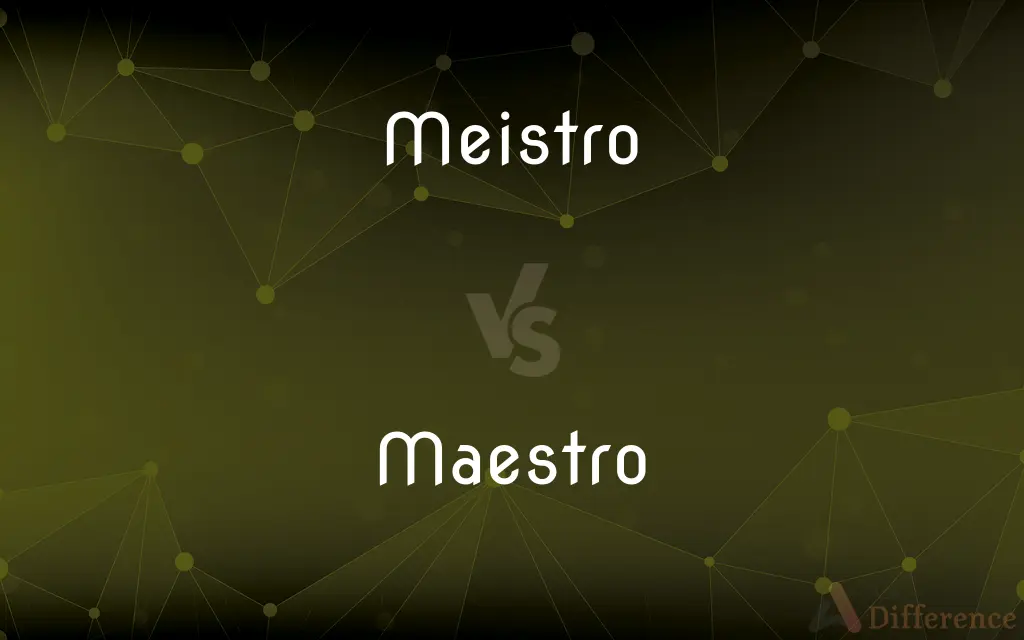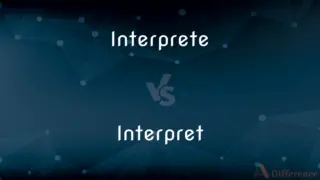Meistro vs. Maestro — Which is Correct Spelling?
By Tayyaba Rehman — Updated on March 26, 2024
"Meistro" is an incorrect spelling. The right spelling is "Maestro," which refers to a master in an art, especially a musical conductor.

Table of Contents
Which is correct: Meistro or Maestro
How to spell Maestro?

Meistro
Incorrect Spelling

Maestro
Correct Spelling
ADVERTISEMENT
Key Differences
"Maestro" starts with "Mae-" like "master," emphasizing its meaning.
Think of a music conductor: a MAE-stro is the MASTER of the orchestra.
Remember the word "Maestro" by pairing it with other music terms like "opera" or "orchestra."
Visualize a Maestro leading a concert to emphasize the spelling.
Only one "i" is in "Maestro," positioned after the "a."
ADVERTISEMENT
How Do You Spell Maestro Correctly?
Incorrect: The orchestra was led by a famous meistro.
Correct: The orchestra was led by a famous maestro.
Incorrect: His skills as a meistro are recognized worldwide.
Correct: His skills as a maestro are recognized worldwide.
Incorrect: She studied under a renowned meistro for many years.
Correct: She studied under a renowned maestro for many years.
Incorrect: He is considered a meistro in the art of cooking.
Correct: He is considered a maestro in the art of cooking.
Incorrect: The piano meistro gave an unforgettable performance.
Correct: The piano maestro gave an unforgettable performance.
Maestro Definitions
A Maestro is a distinguished musician, especially a conductor of classical music.
The maestro led the orchestra with finesse.
In informal terms, Maestro is used as a respectful title for someone eminent.
Welcome, Maestro! We await your expertise.
Maestro signifies a master or teacher in certain disciplines.
He trained under a Maestro in Italy.
Maestro can refer to a figure of authority or leadership in a group.
In the culinary world, he is known as a maestro.
A Maestro is someone skilled in any art or field.
Picasso was a maestro of modern art.
Maestro (; from the Italian maestro [maˈestro; maˈɛstro], meaning "master" or "teacher") is an honorific title of respect (plural: maestri, feminine: maestra). The term is most commonly used in the context of Western classical music and opera, in line with the ubiquitous use of Italian musical terms.
A master in an art, especially a composer, conductor, or music teacher.
A master in some art, especially a composer or conductor.
(slang) A gang elder in prison.
A master in any art, especially in music; a composer or orchestra conductor.
An artist of consummate skill;
A master of the violin
One of the old masters
Maestro Meaning in a Sentence
The maestro conducted the symphony with great emotion.
The maestro took a bow as the audience applauded enthusiastically.
A maestro not only conducts but also deeply understands the music.
The maestro worked closely with the soloists to perfect their performance.
A true maestro knows how to bring out the best in their musicians.
The maestro is known for his meticulous attention to detail.
The young violinist aspires to become a maestro someday.
The maestro received a standing ovation for his breathtaking performance.
The maestro will be guest-conducting the London Symphony Orchestra next season.
Students from around the world seek to learn from the maestro.
The maestro has a unique way of communicating with the orchestra without words.
The maestro was honored with a lifetime achievement award for his contributions to music.
Common Curiosities
What is the pronunciation of Maestro?
It's pronounced as /ˈmaɪstroʊ/.
What is the root word of Maestro?
Derived from the Italian word "Maestro," meaning "master."
Which vowel is used before Maestro?
The vowel "a" as in "a maestro."
Why is it called Maestro?
Derived from Italian, "Maestro" means "master" or "teacher," indicating expertise in a discipline, often music.
What is the verb form of Maestro?
Maestro is a noun; it doesn't have a verb form.
Which preposition is used with Maestro?
"Of" can be used, as in "Maestro of the orchestra."
Which conjunction is used with Maestro?
Any conjunction can be used depending on sentence structure.
What is the plural form of Maestro?
"Maestros" or "Maestri" in Italian contexts.
Is Maestro an adverb?
No.
Is Maestro an abstract noun?
No, it's a concrete noun.
Is Maestro a negative or positive word?
Positive.
What is a stressed syllable in Maestro?
The first syllable "Mae" is stressed.
Which determiner is used with Maestro?
Determiners like "this" or "that" can be used, as in "this maestro."
What is the first form of Maestro?
Maestro is a noun and doesn't have verb forms.
What is the third form of Maestro?
Not applicable.
What is the singular form of Maestro?
"Maestro."
Is Maestro a noun or adjective?
"Maestro" is a noun.
Is Maestro a vowel or consonant?
"Maestro" is a word containing both vowels and consonants.
Is Maestro a countable noun?
Yes.
How many syllables are in Maestro?
Two syllables.
How do we divide Maestro into syllables?
Mae-stro.
What is the second form of Maestro?
Not applicable.
Is the word Maestro imperative?
No.
How is Maestro used in a sentence?
The maestro conducted the symphony with unmatched passion and precision.
Which article is used with Maestro?
Both "a" and "the" can be used, depending on context.
Is Maestro a collective noun?
No.
Is the Maestro term a metaphor?
It can be used metaphorically to denote expertise in areas outside of music.
What part of speech is Maestro?
Noun.
What is another term for Maestro?
Conductor or virtuoso.
What is the opposite of Maestro?
Novice or beginner.
Share Your Discovery

Previous Comparison
Waitting vs. Waiting
Next Comparison
Interprete vs. InterpretAuthor Spotlight
Written by
Tayyaba RehmanTayyaba Rehman is a distinguished writer, currently serving as a primary contributor to askdifference.com. As a researcher in semantics and etymology, Tayyaba's passion for the complexity of languages and their distinctions has found a perfect home on the platform. Tayyaba delves into the intricacies of language, distinguishing between commonly confused words and phrases, thereby providing clarity for readers worldwide.














































